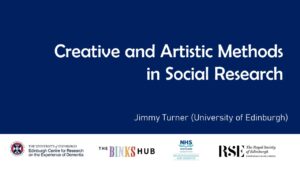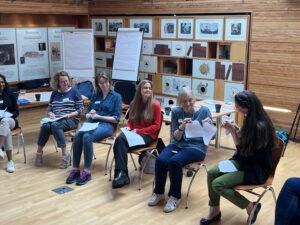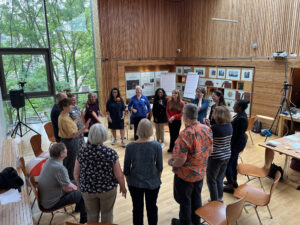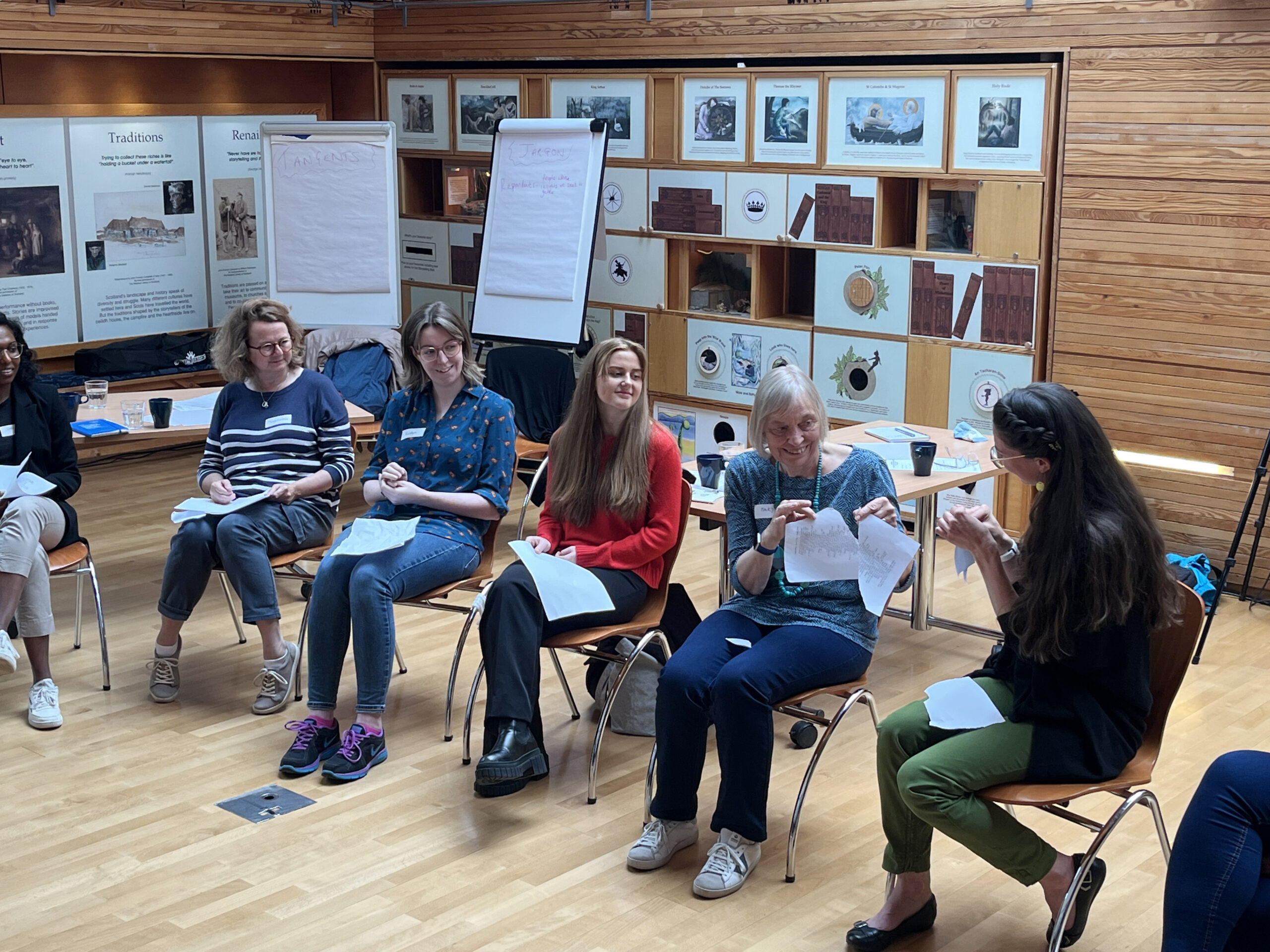Creating the “Don’t Know” Space
On Friday 30th June 2023, we held the 2nd of our INCLUDED workshops: “Creative and Arts Based Methods to Explore What is Important to People Living with Advanced Dementia”.
We were delighted to invite Suzie Ferguson, Therapeutic Clown and Dr Jane Bentley, Specialist in Music in Hospital Care to this workshop to share their experiences of working in meaningful and purposeful ways with people living with a more advanced dementia who often do not use words to communicate.
Dr Jimmy Turner kicked off our session with their presentation on Creative and Artistic Methods in Social Research.
Jimmy reminded us that the most common way of doing social research rely on the use of words, and this includes research about people for whom words are not the best way to express themselves. People living with a more advanced dementia are amongst that group of people, and therefore are often considered as being incapable of fully participating in that research, within our present rigid academic system and structures.
The purpose of the INCLUDED project is to explore how we might find ways to change that system, so that no-one is excluded from shaping the research agenda. Jimmy referred to a Columbian academic, Arturo Escabar, who talks of finding different ways of doing research, and crafting “another space for the production of knowledge another way of thinking “un paradigma otro”, the very possibility of talking about “worlds and knowledge otherwise”. The purpose of this second workshop was to explore ways of doing things “otherwise”, through using different types of language, specifically through creative and artistic methods.
The questions that would guide us through the workshop today were: “How can people living with advanced dementia share their knowledge, experiences and insights with the rest of the world, even if and when speaking and writing do not work well for them?” “How can they also guide, shape and direct research into their lives as not just participants in research, but as researchers in their own right?”
Guest Speakers – Suzie Ferguson and Jane Bentley
We then heard from our guest speakers, Suzie and Jane who gave deeply insightful and moving presentations about their work with people living with a more advanced dementia. It was clear as we listened to these presentations, that if we are prepared to think and act creatively, there are ways to see and hear what is meaningful for people living with a more advanced dementia.
Jimmy’s blog, which you can read here centres around the presentation given by Suzie Ferguson. The blog beautifully captures the artistic and creative approaches that academic researchers would do well to think about as co-researchers with people with a more advanced dementia.
In this blog I reflect on the presentation from Jane Bentley:
Meeting the Musical Moment

Jane spoke about musical engagement with people with a more advanced dementia and reminded us that we are more than just our memories. We are always capable of doing things in the here and now and capable of making creative acts. As we use music to meet people with a more advanced dementia, we do so in a way that is “relational” “engaged” “reciprocal” and “co-created.” Part of the art is to find ways to enter into that co-creative space ethically, knowing that the other person wishes to be part of that co-creation, and constantly “trying to read what matters to people that we’re in the room with.” Jane spoke of not having a planned repertoire but rather carrying in a toolkit of ideas, or a “basketful of invitations” into the space so that “we can be as flexible as we can be and reach in and try and find something.”
I was particularly struck by Jane’s, experience of being in the “don’t know” when co-creating with people with a more advanced dementia. Jane spoke of the time when we have “exhausted ourselves in terms of initiating activities and doing things and leading things” and reaching that “don’t know space. This is often the place when the initiative comes from the “people that we are with because we’re not filling the space with our stuff”. The don’t know space, where the facilitator, or practitioner expects nothing; works flexibly; invitationally; gently; without a fixed idea, seems to create the place where others can lead the way. It offers a platform from which a co-creative activity can begin. As researchers we often have a research question in mind that leads the direction of the research. As I listened to Jane speak, I wondered just how much more meaningful it would be for people with a more advanced dementia, if we allowed ourselves to be vulnerable enough to create a “don’t know” space so that they can find ways to express what is meaningful for them.
Amongst many different roles as a musician, Jane has worked in continuing care and continuing dementia wards. Jane has a 20-year association with this work as a musician, and having the long-term relationships provides Jane with the opportunity to get to know people and therefore have more ideas about what she can carry in her “toolkit” as she enters the wards. Although there is a long-term relationship, Jane emphasised the need to continually assess what might be working in the present moment, and not assume that what worked last time will work again this time. As Jane said, “it’s constantly asking the question, where are we now? And where are we know? And where can we go together?”
Using music as a specific medium, can clearly open a means of communication without words for many people living with advanced dementia. Jane spoke of music being “relationality”, “building communicative partnerships” and being “something that we can do together” in community. Establishing this connection and communication takes skill, time, and an ability to become attuned to the person that you are working with as they become attuned with you, constantly checking in for permission to interact. Jane refers to a “dance of proximity” watching to see “when does your attention come to me?” and “reaching a point of maximum interactivity and reciprocity”. Care and attention is also paid to the way in which the interactions come to an end, ensuring that the end of the interaction is meaningful and respectful and gives value to what has been shared together. Jane spoke of what she has termed a “cognitive window”, a space that opens through the interaction and stimulation where “we have more access to more of ourselves”. Jane told us that in many of the sessions, “somebody who might not use words…uses a couple of words. Somebody who might have fragments of sentences…will suddenly say something that’s absolutely relevant to what we’ve been doing.”
Janes presentation reinforced the need for flexibility, vulnerability, thinking and acting creatively, giving time, and creating a space where people living with a more advanced dementia can lead the way in co-creation.
Following both presentations, Suzy and Jane led us in some powerful, practical sessions that enabled us to experience the ways in which we can connect and engage in reciprocal engagement with others without using words.


Reflections
Hearing the stories and experiences of creative artists, and engaging in the practical sessions, reinforce the possibility co-research with people with a more advanced dementia who do not use words to communication can happen. To do this we need to develop the skills and dedicate the time needed to meaningfully connect with people with a more advanced dementia. This is a real challenge to those of us who conduct academic research within the current frameworks and structures. The challenge we face is to find ways to create a more innovate, more creative and a more flexible framework within which we can create “don’t know” spaces to conduct ethical research and be ethical researchers as we find ways for people with a more advanced dementia to be co-researchers.
As we embrace this challenge, we also need to think about what we mean by co-research as we seek to include those living with dementia who are unable to communicate using words.
This is the topic for our next workshop which takes place on Wednesday 30th August 2023 where we will explore the question:
“What can co-research with people with a more advanced dementia look like?”


